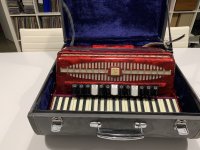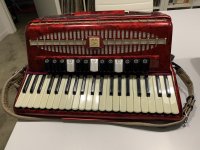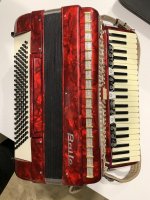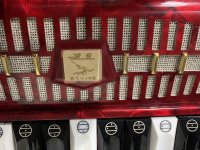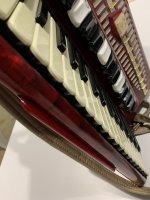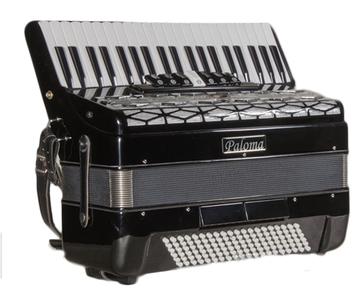CremeFraiche
Newbie
Hi everyone,
I must apologize as I do not play the accordion so please forgive my intrusion. I am hoping that someone here might be so kind as to shed some light on a piano accordion I recently inherited from my Grandfather.
My initial basic googling has led me to believe that it is a Chinese made Bai-le 'Superchampion' 120 bass accordion.
I am wondering if there is anyway that I can find out how old it is and were these any good?
From the pages I have found online it seems as if the older model Bai-le's (60's-70's) were reasonably well made though the quality dropped significantly from the 80's onward? Would anyone agree or disagree with this? I have no idea if the sources I read that from are to be respected or not so I could be wrong.
Tonality wise do people like the sound of these? And by people I mean the accordionists (is that the right term?) that use them.
I sure like the sound of it, though I have nothing to compare it to as I lack the experience.
Also, would anyone be able to tell me how many treble and bass reeds this has and how you figure it out?
I do not plan to sell it as it has sentimental value and I wouldn't mind learning to play it anyway. (I work as a sound designer and intend to spend a lot of time making a multi-sampled instrument out of this also... once I learn how to use it!) I am most curious how old it is though.
It came with a carry case that if I had to estimate it's age I would say the 70's maybe? But that's just a very uneducated guess at best.
I must say the accordion seems to have been exceptionally well looked after which is great. It's quite a beauty to look at and there seems to be not a thing wrong with it mechanically or cosmetically. It was quite a pleasant surprise to find it in my Grandfather's storage shed unassumingly tucked away under his Organ.
If anyone knows any cool tidbits about this model of piano accordion I would love to hear what you have to say.
Thank you very much for your time.
I must apologize as I do not play the accordion so please forgive my intrusion. I am hoping that someone here might be so kind as to shed some light on a piano accordion I recently inherited from my Grandfather.
My initial basic googling has led me to believe that it is a Chinese made Bai-le 'Superchampion' 120 bass accordion.
I am wondering if there is anyway that I can find out how old it is and were these any good?
From the pages I have found online it seems as if the older model Bai-le's (60's-70's) were reasonably well made though the quality dropped significantly from the 80's onward? Would anyone agree or disagree with this? I have no idea if the sources I read that from are to be respected or not so I could be wrong.
Tonality wise do people like the sound of these? And by people I mean the accordionists (is that the right term?) that use them.
I sure like the sound of it, though I have nothing to compare it to as I lack the experience.
Also, would anyone be able to tell me how many treble and bass reeds this has and how you figure it out?
I do not plan to sell it as it has sentimental value and I wouldn't mind learning to play it anyway. (I work as a sound designer and intend to spend a lot of time making a multi-sampled instrument out of this also... once I learn how to use it!) I am most curious how old it is though.
It came with a carry case that if I had to estimate it's age I would say the 70's maybe? But that's just a very uneducated guess at best.
I must say the accordion seems to have been exceptionally well looked after which is great. It's quite a beauty to look at and there seems to be not a thing wrong with it mechanically or cosmetically. It was quite a pleasant surprise to find it in my Grandfather's storage shed unassumingly tucked away under his Organ.
If anyone knows any cool tidbits about this model of piano accordion I would love to hear what you have to say.
Thank you very much for your time.

